Fresh from hosting the UN’s COP28 global summit on climate change, the government of the United Arab Emirates has announced a guideline that by 2031, at least 1% of total fuel supplied at UAE airports to the nation’s airlines will be locally produced sustainable aviation fuel. Following a post-COP28 cabinet meeting, the government also confirmed the UAE aims to produce 700 million litres of SAF per year by 2030, and that a “national regulatory environment for SAF” would be developed. It was not specified if UAE-based airlines or others would be obliged to use the SAF. However, the government’s National SAF Roadmap to 2050, released last year, lays out a strategy to produce the fuel at up to five facilities in the UAE, plans to become a major SAF exporter and an ambition to become recognised as a global leader in, and authority on, SAF.
The UAE hosted the recent COP28 climate summit and ICAO’s third Conference on Aviation Alternative Fuels (CAAF/3) in Dubai, as well as IATA’s Energy Forum in Abu Dhabi. Countries at CAAF/3 agreed a global framework that included an overall 5% reduction in the carbon intensity of aviation fuel consumption by 2030.
The UAE has six international airlines and eight international airports. Dubai-based Emirates is both the nation’s biggest airline and the world’s largest operator of international flights, eclipsing the Abu Dhabi-based national carrier, Etihad, and low-cost airlines FlyDubai, Air Arabia, Air Arabia Abu Dhabi and WizzAir Abu Dhabi, a partnership with European LCC WizzAir.
Based on scheduled airline seats, global aviation data group OAG has also consistently ranked Dubai as the world’s busiest international aviation hub and the second busiest for total flights, marginally behind Atlanta’s Hartsfield International Airport. Its December 2023 assessment reconfirms this.
The UAE’s 1% SAF Guideline and 2031 timing for deployment at its own airports were outlined in a statement to the official Emirates news agency WAM by Ahmed Al Kaabi, Assistant Under-Secretary for the Electricity, Water and Future Energy Sector at the Ministry of Energy and Infrastructure, and chairman of the UAE Sustainable Fuel Committee.
WAM reported that Al Kaabi had confirmed the policy was “the first of its kind in the Middle East, with a target of having at least 1% of the total fuel supplied at UAE airports to UAE airlines be sustainable and produced locally by 2031. Locally-produced SAF will provide added value and bolster research and development efforts, while utilising cutting-edge technology in producing SAF.”
The statement also advised that the Ministry was working with “competent authorities, including the General Civil Aviation Authority (GCAA), to develop implementation plans to ensure the objectives of the guideline are achieved,” including producing 700 million litres of SAF by 2030.
The 1% SAF stipulation for UAE airports and airlines is conservative when compared with the production potential the country has identified in its National SAF Roadmap, which indicates that commercial production of the fuel could commence by 2025.
The scale and schedule for proposed deployment are also at odds with a string of ambitious announcements by the country and companies within it before and during COP28, and significantly lower than targets in other markets, specifically the European Union, where SAF blending mandates will begin at 2% in 2025, rising to 6% in 2030, then 20% in 2035, 34% in 2040, 42% in 2045, and 70% in 2050. However, the EU mandate, with the UK shortly to set a similar policy, does not specify the SAF used must be locally produced.
Major airlines in many markets have committed that by 2030, SAF will comprise between 5% and 30% of the jet fuel they use, while members of the oneworld alliance have signed up for 10%, and the 14-members of the Association for Asia Pacific Airlines have collectively agreed to 5%, with some independently exceeding that figure.
In the past year, Emirates – whose CEO, Sir Tim Clark, has previously expressed doubts the airline industry will achieve its decarbonisation targets – established a $200 million fund to support sustainable aviation innovation, performed two test flights in which aircraft engines were powered by 100% SAF, and announced multiple highly-publicised deals to procure imported SAF.
While it says little about the nation’s plans to deploy the fuel in its home market, the UAE National SAF Roadmap highlights opportunities to exploit demand for SAF in other markets.
It specifies SAF will be produced at up to five plants in the UAE, using three development pathways: the conversion of oils from saltwater-tolerant plants grown in Abu Dhabi, transformation of municipal solid waste to low emission fuel, and power-to-liquid fuels using solar-generated electricity.
“Some of this production could be exported to make use of more mature policies regimes, for example in the European Union, and allocating half of this supply for export opportunities could provide a cumulative $1.7 billion of export revenue for the UAE by 2030,” says the Roadmap report. “This would further diversify the UAE’s economy and contribute to the nation’s current account surplus.”
Producing 700 million litres of SAF by 2030 would cost between $7 billion and $9 billion but reduce cumulative CO2 by an estimated 4.8 million tonnes and create up to 18,000 jobs “across the value chain”.
“Aviation is a global industry, and alongside national efforts, the UAE will seek to accelerate the global transition through leadership at ICAO, and support of projects on renewable fuels and energy in other countries,” the report says.
“The UAE’s commitment to SAF development, highlighted by its ambitious roadmap, will put the nation as a global leader within the sustainable aviation transition.
“The UAE is uniquely positioned to lead global discourse on SAF production and utilisation as part of wider climate change action.
“Beyond COP28, by leveraging its world leading international aviation sector, the UAE can host ICAO, IATA and CAEP (Committee on Aviation Environmental Protection) conferences, reinforcing its position as an authoritative voice within the sustainable aviation movement.”
Image: Emirates

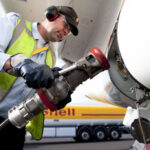


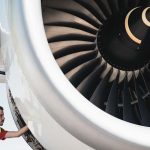

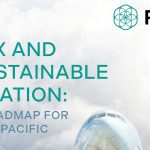
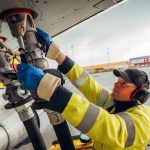
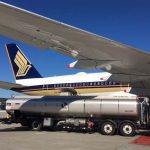






More News & Features
Early data shows uncertainty that UK SAF mandate can be met in its first year
Swiss advanced SAF technology startups Metafuels and Synhelion reach project milestones
PtX fuels have significant Asia-Pacific potential but face many barriers, finds report
Airfreight giants DHL Express and FedEx announce big US SAF deals
Asia-Pacific study reveals pessimistic outlook for SAF uptake by 2030 as Singapore details levy
Supply shortage means airlines have no chance of meeting a 10% SAF by 2030 target, says IATA chief